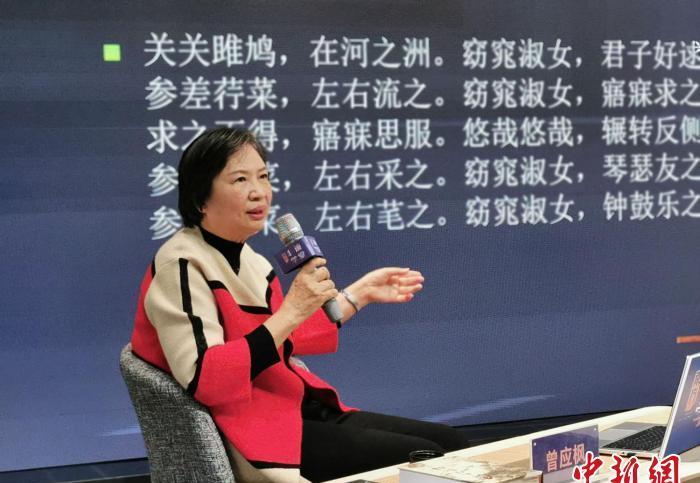
Zeng Yingfeng introduced the production and development of Cantonese nursery rhymes Huang Yiping photo
Guangzhou, January 25( China News Network) Title: Writer Zeng Yingfeng worried about the inheritance of Cantonese nursery rhymes: Word of mouth is fragile
Author Cheng Jingwei Zhu Yinghao
The sixth lecture of the Southern Intangible Cultural Heritage Academy was recently held in Guangzhou. Zeng Yingfeng, a first-class writer of the Guangzhou Academy of Literature and Art Creation, a member of the Expert Committee on the Protection of Intangible Cultural Heritage of Guangdong Province, and a librarian of the Cultural and Historical Research Museum of the Guangzhou Municipal People's Government, systematically introduced the production, development and inheritance of Cantonese nursery rhymes in the contemporary era with the theme of "Folk Chanting in the Cultural Memory of the Guangdong-Hong Kong-Macao Greater Bay Area - Talking about Modern Cantonese Nursery Rhymes".
Folk chants of "events for a specific historical era"
China's poetic tradition has a long history. Zeng Yingfeng introduced that poetry was transmitted from the Central Plains to Lingnan very early, and Qu Dajun, a Cantonese in the late Ming and early Qing dynasties, mentioned in the book "Guangdong New Language": "Cantonese customs are good songs. "Song" refers to a variety of folk songs, including Cantonese minor, Cantonese and Cantonese children's songs.
Zeng Yingfeng further introduced that among these folk songs, Cantonese children's songs are spread in the Pearl River Delta (that is, the Guangfu area) centered on Guangzhou, absorbing the living memories of Cantonese people in the countryside and the villages, condensing the local feelings of the Cantonese people, and is a bright pearl in lingnan folk culture.
It is believed that folk nursery rhymes were widely disseminated after the 1919 song and ballad study movement initiated by Peking University professors Liu Bannong, Shen Yinmo, Qian Xuantong, and Shen Jianshi.
However, Zeng Yingfeng found after systematic examination that as early as the Opium War, Cantonese nursery rhymes had become popular. She listed the nursery rhyme "Sanyuanli Anti-British", each sentence of the work begins in numerical order, vividly reflecting the tenacious struggle of the people of Sanyuanli to resist the British, and clearly reflecting the fighting spirit and courage of the people of Guangzhou against foreign aggression, which was especially widely circulated at that time.
Before and after the Xinhai Revolution, revolutionaries believed that nursery rhymes were "beneficial to children who have not yet learned" and that "enlightenment with songs and ballads to open up children's knowledge is easy to understand and quite legal." Therefore, it was strongly advocated to publish or collect nursery rhyme works in the press to publicize and call on the people to overthrow the feudal monarchy. Since then, Canton nursery rhymes have had new content, and their acceptance groups have further expanded.
"Cantonese nursery rhymes are folk chants of specific eras and years, leaving traces of life in the modern period of the Canton area." Zeng Yingfeng said. In addition to current political songs, cantonese nursery rhymes have more works that reflect daily life, such as "Moonlight" and "Chicken Doll", covering social, natural, historical, geographical and other aspects. Through these folk chants of "origin of events", nursery rhymes have become a bridge for children to learn language, recognize objects and recognize words, and have also become the oral and intangible cultural heritage of mankind.
Cantonese nursery rhymes "one song, multiple versions" and contemporary heritage
In the process of spreading Cantonese nursery rhymes, the difference between synchronicity and circulation is a typical feature of its presentation, and nursery rhymes with the same name will change in words or plot content, and there are many "one song and multiple versions" phenomenon.
Zeng Yingfeng listed the more typical "one song and multiple versions" works, such as "Sanyuanli Anti-British" appeared in the process of circulation, and accompanied by generations of Cantonese nursery rhymes "Moonlight" even has 35 versions, from Guangzhou Liwan, Yuexiu, Haizhu and other regions. Their content is rich and colorful, some are mainly "food", some add customs and customs, and some add marriage and other life contents, which fully shows the creativity of folk culture.
Talking about the reasons for the phenomenon of "one song and multiple versions", Zeng Yingfeng said: "On the one hand, nursery rhymes belong to folk literature and have a keen perception of the development and changes of the times, and their content will also change accordingly. On the other hand, nursery rhymes are spread by word of mouth, and women and children are both creators and disseminators, often adding regional or personal emotional colors to the participation process. ”
At present, the oral transmission of Cantonese nursery rhymes is particularly fragile. As Zeng Yingfeng described: "Children's knowledge comes from books, interest is in electronics and on the Internet, and not singing nursery rhymes has become the norm." As a result, a generation of children can't sing nursery rhymes, and when they grow up, they won't teach their descendants to sing nursery rhymes, and traditional nursery rhymes will gradually be 'forgotten'. ”
As a cultural scholar, Zeng Yingfeng harbored certain anxieties. She said: "To rescue and protect folk cultural heritage is to protect the roots of national dignity and national culture, so that the ancient Chinese civilization can be passed on in an orderly and endless manner." Folk literature is the mother of all literature, to pass on the declining Cantonese children's songs, to rely on the promotion of society and education, to let our college, middle and primary school students from an early age to understand folk culture, inherit folk culture. ”
Zeng Yingfeng looked forward to some practical measures for school-age children, and affirmed the inheritance and practice of Cantonese nursery rhymes in primary and secondary schools represented by The Great South Road Primary School in Yuexiu District, Guangzhou. "These schools not only let children sing traditional Cantonese nursery rhymes, but also encourage children to find interesting life scenes and create new nursery rhyme works, which have produced many results." She said. (End)